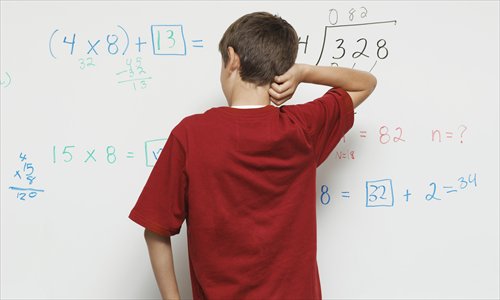You do the math
Can a Chinese mathematics textbook save UK’s student innumeracy woes?

The announcement that a series of Chinese mathematics exercise books will be published in the UK has triggered discussion about the differences in approach to education between the two countries. Photo: IC
Can Chinese mathematics textbooks rescue failing numeracy standards in the UK?
The question has been a topic of intense discussion in both countries following reports around a fortnight ago that British publisher Harper Collins had signed a contact with the Shanghai-based East China Normal University Press to publish its signature series mathematics exercise books, One Lesson, One Exercise, in the UK.
The English publication of the books, which offer graded arithmetic exercises, will encompass the first year of primary school to the last year of secondary school, according to Jiefang Daily.
In China, educators have enthusiastically greeted the announcement as a validation of the methods used to teach mathematics in the country.
But in the UK, concerns have been raised that the introduction of the exercise books could signal a move toward a more "prescriptive" model of teaching unsuited to British schoolchildren.
The announcement comes in the wake of comments made by UK Minister of State for School Reform Nick Gibb, at the end of the last year in which he suggested falling literacy and numeracy standards in the UK could be improved by following text-book oriented models of education as practiced in high-performing jurisdictions like China, Singapore and Finland.
Gibb specifically cited a China-UK mathematics teacher exchange last September as an evidence that high-quality textbooks could help structure lessons and learning progression "to ensure that all pupils keep up and achieve."

Some educators suggest that China's textbook-oriented education gives students an advantage in basic arithmetic, but there is disagreement as to whether Chinese textbooks can be a solution for poor numeracy levels in the UK. Photo: IC
Defining the problem
As part of a "war on illiteracy and innumeracy," the incumbent government led by the UK's Conservative Party has declared that under new education initiatives, children in the UK should be able to recite their times tables up to 12 by the time they leave primary school or their head teachers will be sacked. But when asked by reporters in public appearances recently to answer a simple times table question, both Prime Minister David Cameron and Education Secretary Nicky Morgan refused, according to a Daily Mail report.
A report published by British charity organization National Numeracy in March last year suggested that poor adult numeracy in the UK could cost the country's economy up to 20 billion pounds ($29.5 billion) per year, due to the wages lost by half the country's working-age population having no better numeracy knowledge than that expected of a 9 to 11-year-old.
Lauren Dummer, a 19-year-old freshman at the University of Bristol majoring in accounting and finance, admitted that some of her Chinese classmates seemed to be able to do calculations more quickly than their British peers.
"[There's a stereotype] that Chinese people are good at math, and from my experience of meeting Chinese people, it does seem to be true," said Dummer.
Nevertheless, Dummer also spoke highly of the education she received in mathematics before going to college.
"[My teacher] had such a great wealth of knowledge and great ways of teaching for us to easily understand," she said. "He was always willing to give me the time to go through and explain the questions, even if they were just stupid ones."
Ni Ming, head of the supplementary books department at East China Normal University Press, said that mathematics education in China has always focused on drilling children on the basics, so they would have a strong foundation.
"This is the advantage of the Chinese system," said Ni. "The 'two basics' ['basic knowledge' and 'basic skills'] are put forward clearly and have been stressed in our country's teaching syllabus since the 1950s."
Ni said the emphasis placed by teachers and students on solving basic arithmetic problems, and the well developed market for auxiliary exercise books like One Lesson, One Exercise, could be seen as a major reason for Chinese students' success in international assessments.
He said given China's strong reputation, it was "only natural that other countries should seek to learn from us."
In 2012, students from Shanghai ranked first in the Programme for International Student Assessment (PISA) numeracy tests, while peers from England ranked 26th.
Dummer said that the British model of teaching mathematics placed a greater emphasis on logic and deduction, rather than rote calculation, and that she was rarely assigned arithmetic problems for homework.
Dummer, a straight-A maths student at high school, admitted to sometimes forgetting her times tables.
As for whether these differences gave Chinese students an advantage when it came to university, Dummer suggested that in her experience, one's personal motivation to learn was a more important factor.
"It might give a small advantage but not enough to create a gap between British students and other international students," said Dummer.
"It's hard to compare education systems between different countries," said Ni.
Finding the solution
The possible transition to a more Chinese style model of teaching mathematics has been a contentious issue in the UK.
Its most vocal advocate in the UK has been Tim Oates, head researcher at exam body Cambridge Assessment, who argues that a standardized text-book could help turn around the UK's well-documented failures in basic numeracy.
But in an opinion piece for the British newspaper the Guardian, Ruth Merttens, professor of primary education at University of St Mark and St John, argued that there was no evidence that textbook-oriented teaching could help improve numeracy levels in schools.
Merttens noted that while some countries that used state-prescribed textbooks for their mathematics curriculums, like China and Singapore, did well in international assessments of numeracy levels, there were also countries who followed such an approach but did poorly.
Merttens concluded by suggesting that the problem in the UK may be with teacher training, rather than the teaching materials used.
The UK's Department for Education pointed out that the forthcoming publication of One Lesson, One Exercise in the UK was not being undertaken by the government, but an independent publisher, and refused further comment, according to a Xinhua report.
Ni said that while the announcement that their series of exercise books in the UK has grabbed headlines, the East China Normal University Press had already published several series of educational exercise books in other countries, such as Singapore and South Korea.
"They did well in the market," said Ni.
"Most of the books are in math, some are in physics or chemistry."
Regarding the forthcoming publication of the One Lesson, One Exercise series in the UK, Ni said that the books would be re-edited to be more suitable for the British curriculum.
He said Harper Collins had expressed confidence that the books would be well-received in the UK, but he was personally a little worried that British students would not be accustomed to the degree of difficulty of the exercises in the books.
Ni added that he hoped the books could be a window for British teachers and students to learn about mathematics education in China.
A combined formula
Zhou Shuai, a renowned math teacher who works at the New Oriental Education Institute, said that both systems had things to learn from each other.
"In terms of teaching mathematics, the Chinese system focuses more on imparting the basics - the methods for solving problems - in order to create a strong foundation for complex mathematics in later study," he said.
Zhou said that Chinese students' success in international competitions could be attributed to this philosophy. "Teachers [in China] use lots of repetitive exercises to strengthen their students' understanding."
He said that while the Chinese approach to teaching arithmetic yielded results in exams and international assessments, the problem was that it did not always foster a genuine interest or passion for math.
In terms of exporting textbooks of such exercises to the UK, Zhou said that they would need to be adapted to incorporate more real-life situations and research-based questions in order to appeal to their audience.
"Strict adherence to the Chinese approach can limit students' mindset to simply solving arithmetical problems, instead of exploring research or studying the subject more deeply."
In his own teaching Zhou said he combines both Chinese and foreign materials and methods.
He said he enjoys trying more experimental methods of teaching, and stressed the importance of teachers helping students arrive at conclusions together, rather than the teacher just dictating answers.
Zhou dismissed the idea that Westerners were poorer at math than Chinese, arguing that it was a matter of individual aptitude, and that the differences were more nuanced than a simple matter of "better" or "worse."
"[For example], some linguists have made a point about how differences between the Chinese and English languages may lead to differences in the way we memorize and calculate," he said.